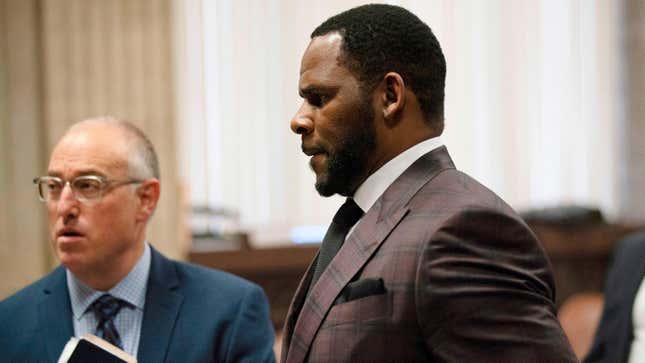
“For many years, what happened in the defendant’s world stayed in the defendant’s world. But no longer.”
Those words, spoken by Assistant U.S. Attorney Elizabeth Geddes on Wednesday, were just a snippet of compelling closing arguments given during the federal sex trafficking trial of disgraced R&B singer Robert Sylvester Kelly, aka R. Kelly in Brooklyn court.
As the New York Times reports, the defense rested earlier in the day on Wednesday after presenting nearly a half-dozen witnesses. Afterward, prosecutors began summarizing the facts of their case against Kelly to jurors, weaving together bits and pieces of testimony from over 45 witnesses—11 of whom were accusers and took the stand over the last five weeks—in order to paint a picture of the entertainer as the head of a criminal enterprise that used his money and status to systematically abuse underage girls, boys and women.
“Over the past two decades, the names of the individuals have changed. But their roles have remained the same. And from the beginning, the defendant has been the leader,” Geddes explained.
More on the prosecution’s closing arguments, per the New York Times:
She [Geddes] also described a system of control that entrapped his accusers and blocked them from speaking out. Ms. Geddes said that system included letters written by Mr. Kelly’s accusers that she said were filled with lies absolving him of crimes. The letters were locked away because he intended to use them in the future, Ms. Geddes said.
When women “crossed him” and opted to go public with their allegations, Ms. Geddes said, Mr. Kelly “used his henchmen to lodge threats and exact revenge.”
Referencing a slide show playing in the courtroom for jurors, she directed their attention to the transcript of an audio clip they had heard during the trial.
In the snippet, Mr. Kelly warned any accusers who he believed had stolen from him, saying “people get murdered” for that behavior, using an expletive.
“That was a threat,” Ms. Geddes said.
Of the racketeering charge that’s also been central to the prosecution’s arguments, Geddes explained: “The law recognizes when someone commits a crime as part of a group, he’s more powerful—more dangerous. Without his inner circle, the defendant could not have carried out the crimes he carried out for as long as he did.”
Geddes then went on to specifically highlight Kelly’s illegal marriage to Aaliyah, testimony from accuser Sonja, who claimed the “I Believe I Can Fly” singer raped, imprisoned and starved her over the course of several days in his studio and key testimony points from several of Kelly’s former employees. But arguably, the prosecution’s best illustration came from a document prepared by one of Kelly’s former accountants John Holder, who testified in defense of Kelly, that, as Buzzfeed News reports, showed “a large red cartoon octopus, with its tentacles labeled with the names of the defendant’s employees. Across the top, in large letters, Kelly was listed as CEO.”
Though a verdict date is uncertain, U.S. District Judge Ann M. Donnelly will “instruct the jury in how they are to deliberate on the nine counts Mr. Kelly is charged with—one racketeering count and eight counts of violating the Mann Act, an anti-sex trafficking statute.”
In addition to the crimes he faces in New York, Kelly is also facing additional charges across Illinois and Minnesota including charges of sex crimes, human trafficking, child pornography, racketeering, obstruction of justice, kidnapping and forced labor. He has pleaded not guilty to all charges.

